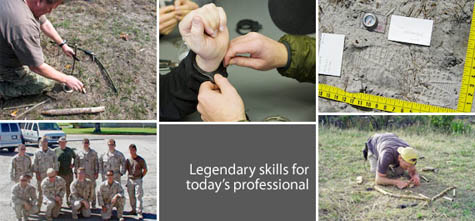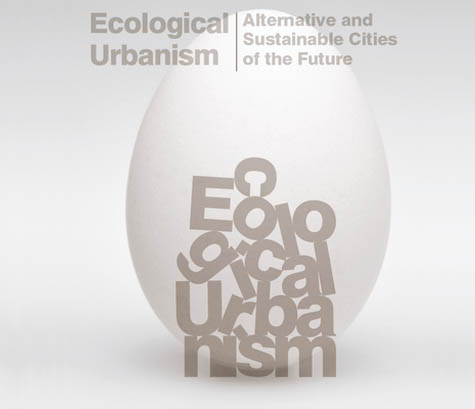Talks, Tours, and the Cities of Tomorrow
 [Image: Photo by Satya Pemmaraju, courtesy of the Architectural League].
[Image: Photo by Satya Pemmaraju, courtesy of the Architectural League].Here are some upcoming events, courses, and lectures that I would attend if I could:
—Tonight, March 26, author William L. Fox speaks in Reno at the Nevada Museum of Art about his new exhibition, co-curated with Matthew Coolidge of the Center for Land Use Interpretation, about the Trans-Alaska Pipeline. Hopefully Fox will also discuss his newest book, Aereality: The World From Above; Fox's books are an ongoing exploration of "extreme environments" and their impact on human cognition, from Antarctica and the gridless deserts of Nevada to the Australian Outback and even Mars.
—Also today, March 26, kicking off in Los Angeles (and then again four days from now, on March 30, in Chicago) is an Urban Escape and Evasion course run by the group OnPoint Tactical. The premise of this is hilarious but fascinating: "While on an international business trip, you are kidnapped and held for ransom. A terrorist attack closes the business district and you find yourself in a fix. How do you stay alive? How do you get to safety on your own?"
- This class provides leading-edge skills to civilians who live and work in challenging urban environments or in urban centers that may destabilize during a crisis. Topics covered include covert movement (day vs. night), the judicious use of caches, understanding urban baseline movement and urban awareness training, the use of urban disguises and false papers/identification, lock picking, escaping from unlawful custody, obtaining and driving local transportation, the use of "specialized" urban gear, and instruction on how to develop urban escape and evasion go-bags, etc.
 [Image: Think you'll survive a corporate kidnapping (or the coming apocalypse)? OnPoint Tactical disagrees; sign up for their courses to learn more].
[Image: Think you'll survive a corporate kidnapping (or the coming apocalypse)? OnPoint Tactical disagrees; sign up for their courses to learn more].—March 27-29: The City From Below hits Baltimore, Maryland, exploring, among other things, how "unanticipated futures are being imagined and built" in the contemporary metropolis. My problem with the event write-up, however, is that participating in "social justice struggles" appears to mean adopting a new, niche vocabulary full of analytically useless words like "herstories" – i.e. feminism's own "Freedom Fries" moment – excluding from your audience many of the very people who would benefit most from such discussions. Emerging forms of grassroots urban self-governance don't require bizarre, over-academized newspeak about "metropolitan rearticulation" and "horizontal framework[s] of participation." We don't need to know that you've read Judith Butler in order to organize a better youth basketball league, plant a roof garden, or campaign for affordable day care. I also have a growing problem with the fetishization of "resistance" in today's leftwing political writing, as if "resisting" something is, in and of itself, a technique that only the left is capable of performing. But the Bush Administration "resisted" the Geneva Conventions and Alberto Gonzales "resisted" civil liberties laws, even as the Mormon Church "resisted" gay marriage in California. Resistance has no political affiliation, and it is tactically meaningless to promote resistance as a goal in and of itself. One need look no further than the conservative Counter-Reformation; as its very name indicates, this was a massive act of cultural and intellectual resistance. Indeed, to pretend that "resistance" is worthy of commendation at all only makes sense if you've built your entire movement around a shifting sequence of enemies who, by your own admission, are always one step ahead of you. The alternative – articulating, out of the blue and in the middle of nowhere, unsolicited enthusiasm for a more equitable future for everyone – would seem both substantially more effective and unifying. It seems little wonder, then, that many otherwise intensely interesting urban social justice movements remain rhetorically self-ghettoized, when their own communication strategies seem to exclude the very people they most urgently need to convince.
—On Monday, March 30, London's Complex Terrain Laboratory will begin a four-day symposium about P. W. Singer's important new book Wired for War (previously mentioned on BLDGBLOG here). As the event unfolds, regular updates will be posted online.
 [Image: Ecological Urbanism at the Harvard GSD].
[Image: Ecological Urbanism at the Harvard GSD].—If it wasn't for Postopolis! LA, I would be in Boston, attending Harvard's Ecological Urbanism conference, running April 3-5. "While climate change, sustainable architecture, and green technologies have become increasingly topical," we read, "issues surrounding the sustainability of the city are much less developed."
- The conference is organized around the premise that an ecological approach is urgently needed both as a remedial device for the contemporary city and an organizing principle for new cities. An ecological urbanism represents a more holistic approach than is generally the case with urbanism today, demanding alternative ways of thinking and designing.
—Saturday, April 4, in Montreal, the excellent Canadian Centre for Architecture will sponsor Mapping Rural Montréal: "Artist Amy Franceschini leads an exploration of rural sites and activities in Montréal, questioning the dichotomy of country and city (in English). $10 per person. Free for children under 12. Reservations required: (514) 939-7026."
—On April 25, Esotouric will be hosting a bus tour of Raymond Chandler's Los Angeles: "Bungalows. Crime. Hollywood. Blondes. Vets. Smog. Death. This was Raymond Chandler’s Los Angeles, which resonated from deft and melancholy fits of his writer’s bow." Esotouric's Reyner Banham Loves Los Angeles tour also looks well worth a spin.
—Finally, for now – as there are dozens and dozens of other amazing events I could mention – the Architectural League in New York is hosting what sounds like an exciting two-day conference called New Architectures of India, from April 30-May 1. It will "address the architectural and urban forms that are emerging as a turbulent 'second modernity' rearranges a vast part of the landscape of India."
All of these are barely the tip of the iceberg, however; I'll hope to keep track of other lectures, events, gallery openings, conferences, courses, and such like as the year trundles on.





Comments are moderated.
If it's not spam, it will appear here shortly!
OnPoint seems incredibly fascinating... seems semi-illegal though, use of false paper and identification, nice...
"even as the Mormon Church "resisted" gay marriage in California."
I seem to recall a substantial majority of voters in California of all sorts resisting this as well.
Gerard - thus the bill's passage. But it seems foolish not to look at how that broad-based support was achieved, as it has substantially to do with the exposure this Proposition received through private funding, funding that was connected to out-of-state Mormon donors.
I support gay marriage. I understand that, but the irony was -- after the election was analyzed -- that some of the largest voter blocks that passed it were African-American. And yet one did not see gay activists parading through the streets of south central and fulminating at African-American churches, only at the much, much safer Mormons. I'd say that shows somewhat less than the courage of one's convictions.
In addition, one would note that the opposition to the measure also received a large amount of private funding from organizations and individuals in favor of gay marriage. Our you saying that the latter was okay but the former not okay?
Gerard, I'm not saying that either is okay - although I'm curious why "individuals in favor of gay marriage" would have donated money in support of this particular Proposition.
For my own part here, I am more or less just lazily highlighting the private moneys raised by religious groups – in particular, Mormon groups – in support of the bill. The fact that "one did not see gay activists parading through the streets of south central and fulminating at African-American churches, only at the much, much safer Mormons," is a sad sign of the way political protests now work - however, my own post clearly falls into the same pattern of taking aim at easy targets.
But, even having said that, my original point stands - which is that, from the standpoint of those who supported the passage of Proposition 8, they were doing so as an act of political resistance to the existing state of affairs, in particular to the apparently domineering (and now infamous) taunts of San Francisco mayor Gavin Newsom and his "whether you like or not" quip that was so endlessly replayed here. To use the absurdly vacuous catch phrase of far too many political groups today, Prop 8 supporters were "sites of resistance" - because resistance is a politically neutral strategy with no allegiance to a particular party or social agenda. WalMart "resists" the Environmental Protection Agency whenever it builds a new store on a wetlands site. Etc. etc.
What I meant was that those in favor of gay marriage funded their side of the debate.
But I do take your larger point about resistance as being correct.
Ecologists seem to be under-represented at the *Ecological* Urbanism conference.
To see the ecological urbanism conference from the students perspective go to out blog:
http://gsd-ecologicalurbanism.blogspot.com/
Post a Comment